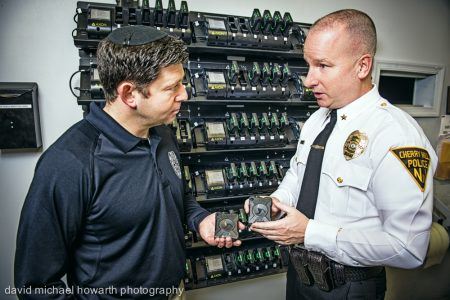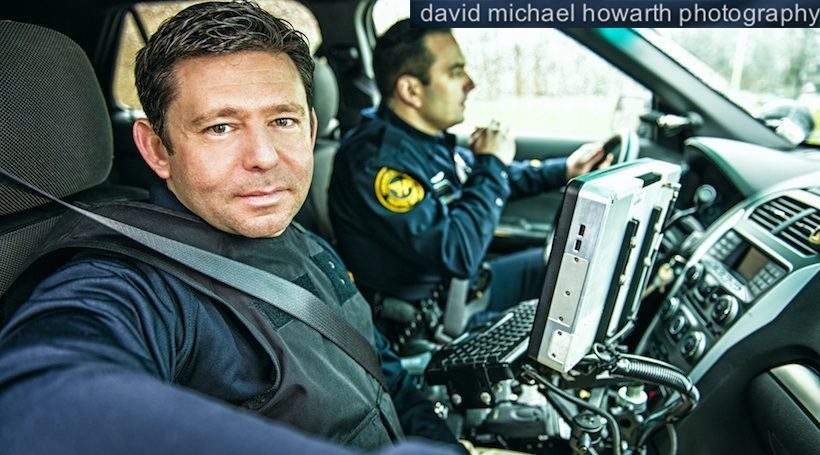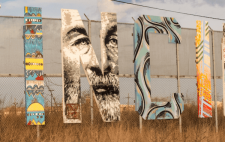On the rare nights when his calendar is clear of bar mitzvahs, weddings and other rabbinic responsibilities, Larry Sernovitz dons body armor and police-issued attire.
As a police chaplain, the Cherry Hill rabbi could spend the night on a domestic abuse call or at an attempted suicide – or both. Sernovitz, 44, has been a sworn-in member – albeit a volunteer – of the Cherry Hill Police Department for two years, riding along with officers to provide on-site comfort and understanding in the middle of chaos and crisis. He is one of three chaplains on the Cherry Hill force: two rabbis and one Catholic priest.
The chaplains also minister to the police, helping them cope with the stress of the job. “I have the opportunity to let the officers know they’re cared about. They’re not alone,” says Sernovitz, who was until recently a spiritual leader at Temple Emanuel.
In the past few years, a number of South Jersey communities have formalized relationships with local spiritual leaders. Besides Cherry Hill, police chaplaincies thrive in Burlington City, Camden County, Evesham, Maple Shade and Palmyra, to name a few. Within these communities, dozens of leaders representing multiple faiths and denominations have undergone training to better understand modern police work, from how officers decide to use force to the psychological toll law enforcement work takes.
It is by no means a new concept; clergy have accompanied American troops into battle since the Revolutionary War. But the role of the clergy in the past was largely ceremonial and the ties between police and clerics more informal. Few, if any, received first-responder training to fully understand the complexities of law enforcement, says Rev. Gary Holden, founder of The Police Chaplain Program of New Jersey, a Vineland-based organization that has trained hundreds of religious leaders since 2011.
“The beauty of providing this training,” explains Holden, senior chaplain of the Vineland Police Department who also serves the Cumberland County Sheriff’s Department and the New Jersey State Police, “is that, no matter what their religion, they learn so much about law enforcement – what goes on, what stresses officers are under – and it’s like a light bulb goes on.
It’s a really nice marriage, bringing the two together.”
In Holden’s words, chaplaincy is a “ministry of presence.” While a pastor takes an active role in people’s faith development, a chaplain supports people where they are at that moment.
His own chaplaincy work dates to the 9/11 terrorist attack, when he volunteered to work at Ground Zero. He spent two weeks there, comforting first responders in the throes of search and recovery work, praying with them when remains were found. More recently, he has traveled with other chaplains to Ferguson, Mo., and Baltimore to help defuse tense situations, he says.
“We work with the police departments, helping them deal with all the stress, and we are also there for the people,” Holden says. “We do a lot of hugging and letting people know we’re there for them on both sides.”
Local clergy say chaplaincy work comes naturally for them, but the preparation and time is a major commitment. They typically attend two full days of basic-training coursework provided by Holden’s program. It covers a variety of topics, from how to aid law enforcement in crisis situations and the delivery of death notifications to suicide awareness and appropriate responses in the event of an officer’s injury and death.


Rabbi Larry Sernovitz speaking with Cherry Hill Chief of Police William “Bud” Monaghan.
“It’s important for them to put on the vest and ride along to see what officers deal with every day on the streets and to see the inside training police officers undergo,” explains Cherry Hill Chief of Police William “Bud” Monaghan. “If an officer calls on them with concerns, the chaplains, in essence, have lived it. They’re more relatable to the officers.”
Sernovitz has also watched training at the shooting range, where officers use paint bullets in their guns and act out possible scenarios. “It’s as real as it gets,” he says.
In one exercise, officers acted out routine traffic stops turned violent. “The officers had to simulate pulling someone over in which the driver pulls a gun,” he says. “The paint bullets showed whether they hit the driver, and if they did, exactly where they hit.”
The exercise made Sernovitz realize the seriousness of the officers’ work. “We drive by police pulling over cars all of the time and think nothing of it,” he says.
Monsignor Michael Mannion says his work as a police chaplain is deeply fulfilling and often involves situations of life and death. There have been times, he notes, when he has been called to comfort the family of a police officer shot in the line of duty as well as the family of the slain shooter.
“I can’t change the outcome, but I can walk with them through the journey and the pain,” says Mannion, the director of community relations for the Diocese of Camden who serves numerous police departments, including Cherry Hill, Camden County and the New Jersey State Police. “I can let them know they are not alone and be a sounding board for them in their grief.”
Gaining the trust of officers is the foundation to the relationships, he says, noting that chaplains very clearly understand their role is to stay clear of preaching.
“We respect everybody whether they have a faith commitment or not,” he says. “As a Catholic, I don’t help people because they’re Catholic; I help people because I am.”
Cherry Hill’s formalized program was created in 2014, although Mannion’s service started prior to that. Sernovitz went through the chaplaincy training course with Congregation Sons of Israel Rabbi Ephraim Epstein. Each has full access to the department and has taken on additional roles, such as sitting in on interviews with perspective hires. Epstein says he goes on drive-alongs four to six times a year.
In one drive-along, a call came in on a Saturday night about a car that had hit another car and left the scene. When Epstein and the officer arrived, “The officer knew the topography of the neighborhood so well that he was able to figure out where the person lived who hit the car,” says Epstein. “He had a summons ticket under the person’s door in no time.”
Epstein, who leads an Orthodox synagogue in Cherry Hill’s west side, recently led an in-service class explaining the Jewish calendar and dynamics of religious life to help officers gain a better understanding of the growing observant community.
Chief Monaghan says the relationships he has formed with the clergy have built stronger connections between the force and the communities it serves. His strong relationship with Rabbi Epstein has been invaluable in strengthening collaboration between law enforcement and the religious community on security measures, he notes.
Following the Orlando night club mass shooting in June, Sernovitz invited Monaghan to speak during a vigil for victims.
At the moving event, the rabbi introduced the chief to both Imam Morshad Saami Hossain of the Voorhees Islamic Center and Ted Winsley, pastor of The Family Church, a predominantly African-American ministry with locations throughout Camden County. Monaghan says he has now cultivated stronger relationships with both spiritual leaders.
“Rabbi Larry was my conduit,” he says. “These relationships have been positive for the community as well as the police.”
Evesham’s chaplaincy program started around the same time as the Cherry Hill program. Police Captain Thomas Reinholt said he was pleasantly surprised when he sent out letters to the clergy of all 11 houses of worship in the township announcing the program, and all 11 asked to be included.
Like Cherry Hill, clergy in Evesham’s program have also formed closer relationships among themselves, Reinholt says.
“They have always held interfaith services in the township, but the clergy have now gotten to know each other so much better through the chaplain program,” Reinholt says. “This was an unexpected but very awesome result.”
Rabbi Gary Gans says he finds incredible value as a chaplain. A baby boomer who was involved in anti-war protests in the 1960s, he says the work has been part of his personal evolution.
“In the ’60s, I was on the other side of the barricade attempting to improve the world and stop the Vietnam War,” observes Gans, from Marlton’s Congregation Beth Tikvah. “Police were on the opposing side. We didn’t understand them, and they certainly didn’t understand us. The level of miscommunication at the time was even more dramatic than the gap we see today.”
Through the chaplaincy work, Gans knows many of the police officers personally, has a better understanding of the pressures they’re under and respect for their dedication to serving the community.
“I do not blankly accept every action police officers take; people’s lives are at stake,” he says. “But I greatly appreciate the challenges they face in their occupation. Our force has worked to get below the surface – so we know them and they know us. God forbid, if ever there is a crisis in the community, the communication is set up.”










